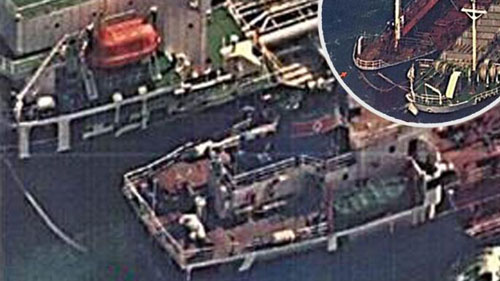by WorldTribune Staff, March 22, 2019
The United States on March 21 imposed new sanctions on two Chinese shipping companies which the U.S. Treasury Department said helped North Korea evade sanctions.
But on Friday, President Donald Trump in a tweet walked back the decision after North Korea removed its representatives from the inter-Korean liaison office in Gaeseong, North Korea just North of the truce village at Panmunmom in the Demilitarized Zone.

Sanctions imposed in the wake of Pyongyang’s nuclear weapons and ballistic missile tests through 2017 include a cap on the Kim Jong-Un regime’s imports of refined petroleum and a ban on its exports of coal.
The Treasury Department announced it is sanctioning Dalian Haibo International Freight Co. Ltd. and Liaoning Danxing International Forwarding Co. Ltd.
Treasury also said it is updating its advisory on North Korea’s illicit shipping practices to name dozens more vessels suspected of exporting North Korean coal or engaging in ship-to-ship transfers of refined petroleum.
Dalian Haibo provided goods and services to or in support of Paeksol Trading Corp., a North Korean entity previously sanctioned for engaging in metal or coal trade and possibly providing revenue to the Pyongyang regime, the Treasury Department said.
Liaoning Danxing operated in the transportation industry in North Korea and “routinely used deceptive practices” that helped North Korean procurement officials in the European Union to purchase goods for the regime, the department said.
The sanctions freeze the companies’ property and interests in the U.S. and its property and interests which are in control of U.S. citizens.
Treasury said North Korean ports received at least 263 tanker deliveries last year of refined petroleum via illicit ship-to-ship transfers.
If these tankers were full, North Korea would have imported 3.78 million barrels, or more than 7.5 times the amount permitted under the U.N.-imposed cap of 500,000 barrels a year.
The Treasury Department also named 71 more vessels, in addition to the 24 listed last year, that are believed to be capable of engaging in or have already engaged in ship-to-ship transfers of refined petroleum, or thought to have exported North Korean coal.
Treasury also marked the southern South Korean cities of Busan, Yeosu and Gwangyang on a graphic illustrating the ports of call before and after the ship-to-ship transfers of refined petroleum.
The department said North Korea has used a variety of deceptive shipping practices, including disabling or manipulating the internationally accepted Automatic Identification System; physically altering vessels; transferring cargo from ship to ship at sea, rather than in port; and falsifying cargo and vessel documents.
“Treasury will continue to enforce our sanctions, and we are making it explicitly clear that shipping companies employing deceptive tactics to mask illicit trade with North Korea expose themselves to great risk,” Treasury Secretary Steven Mnuchin said.
Soon after the new sanctions were announced, North Korea withdrew its officials from the inter-Korean liaison office, according to the unification ministry.
On March 22, “the North Korean officials notified the South of the decision to withdraw from the office, citing instructions from their superiors,” the Ministry of Unification said in a statement.
The two Koreas established the communications office in Gaeseong, North Korea, last September, to boost reconciliation.
The ministry urged the North to send back its officials as early as possible, saying that staff from the South will remain there. The North did not respond, only saying that it would discuss the details of the decision in the future.
Your Intel Brief: Geostrategy-Direct __________ Fix The Media Now
